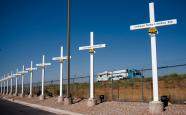U.S. Supreme Court Denies Hearing of 10th Circuit Ruling on Roadside Crosses

31 October 2011. Supreme Court avoids dispute over highway crosses. (Jennifer Dobner, Associated Press)
31 October 2011. U.S. Supreme Court refuses to hear UHP crosses case. (Aaron Falk, The Salt Lake Tribune)
31 October 2011. FRC blasts Supreme Court for allowing decision to stand that removes roadside crosses in six states. (Christian Newswire)
31 October 2011. Supremely scary: Justice Thomas’ approach to church-state relations is truly frightening. (Rob Boston, Americans United for Separation of Church and State, Wall of Separation)
Link to Case Portal on Religion and Law Consortium
6 January 2011: Tenth Circuit stays order to remove roadside crosses pending appeal to U.S. Supreme Court.
20 December 2010: Tenth Circuit denies petition to re-hear UHP cross case. (American Atheists, Inc., et al. v. Davenport et al.)
A three-judge panel of the U.S. Court of Appeals for the Tenth Circuit has ruled in favor of plaintiffs-appellants in American Atheists, Inc. et al. v. Duncan et al. (the state of Utah), a case involving the display of 12-foot-high metal crosses erected alongside Utah highways in memory of fallen Utah Highway Patrol troopers. The 18 August 2010 ruling reverses the district court ruling in American Atheists v. Davenport to find the display of the crosses unconstitutional. The appeals court held that “these memorials have the impermissible effect of conveying to the reasonable observer the message that the State prefers or otherwise endorses a certain religion. They therefore violate the Establishment Clause of the federal constitution.”
The Alliance Defense Fund has announced intentions to appeal the decision to the U.S. Supreme Court, citing the contrary notion articulated in the Court’s recent decision Salazar v. Buono: “The goal of avoiding governmental endorsement does not require eradication of all religious symbols in the public realm. A cross by the side of a public highway marking, for instance, the place where a state trooper perished need not be taken as a statement of governmental support for sectarian beliefs. The Constitution does not oblige government to avoid any public acknowledgment of religion’s role in society.”